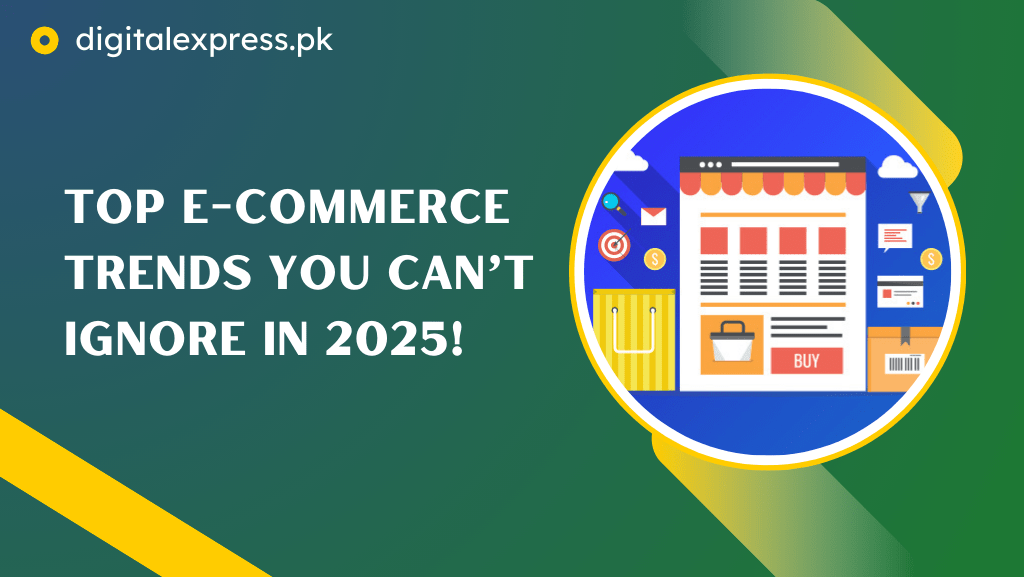E-commerce is evolving at an unprecedented pace, and businesses must stay ahead of the curve to thrive. The future of online shopping is shaped by emerging technologies, shifting consumer behaviors, and innovative digital commerce strategies. To remain competitive, retailers must embrace the latest e-commerce trends 2025 offers.
Top E-Commerce Trends
Here, we’ll explore the top trends defining the future of online shopping, including retail technology innovations, emerging e-commerce technologies, and the growing influence of AI in e-commerce.
1. AI-Powered Personalized Shopping Experiences
The use of AI in e-commerce is revolutionizing the way consumers shop online. Artificial intelligence enhances personalization, allowing retailers to:

- Analyze customer behavior and preferences
- Offer tailored product recommendations
- Optimize pricing strategies
- Improve chatbots and virtual assistants for real-time support
AI-driven personalization ensures a seamless and engaging personalized shopping experience, leading to higher conversion rates and customer satisfaction.
The Role of Machine Learning in E-commerce
Machine learning (ML) is taking AI-driven shopping experiences to the next level by:
- Automating customer segmentation
- Predicting purchasing trends
- Enhancing fraud detection and security
Retailers that leverage ML can provide a more dynamic and efficient shopping experience.
AI-Powered Chatbots and Virtual Shopping Assistants
AI-powered chatbots are transforming customer service by:
- Offering 24/7 support
- Providing instant responses to customer queries
- Assisting with personalized product recommendations
- Enhancing the overall shopping journey
As chatbot technology continues to improve, businesses that adopt AI-driven customer support will benefit from increased efficiency and customer satisfaction.
2. The Rise of Social Commerce
Social media platforms are becoming powerful sales channels, fueling social commerce growth. In 2025, more brands will integrate e-commerce features directly into platforms like Instagram, TikTok, and Facebook. Key aspects of social commerce growth include:

- In-app checkout and shopping features
- Influencer marketing collaborations
- Livestream shopping events
- AI-powered social media ads
Businesses leveraging social commerce growth will reach wider audiences and drive more sales through interactive and engaging content.
How to Optimize for Social Commerce Success
Retailers can maximize their social commerce potential by:
- Engaging with their audience through authentic storytelling
- Utilizing AI-driven ad targeting to personalize campaigns
- Collaborating with influencers to build trust
A strong social commerce strategy can significantly boost brand visibility and conversion rates.
3. Omnichannel Retail Experience is a Necessity
Consumers expect a seamless shopping journey across multiple touchpoints. The omnichannel retail experience ensures consistency between online and offline interactions. Successful strategies include:

- Unified customer profiles for personalized recommendations
- Buy online, pick up in-store (BOPIS)
- Real-time inventory tracking
- Mobile-friendly shopping interfaces
Retailers embracing an omnichannel retail experience will retain more customers and boost brand loyalty.
The Importance of Customer Data Integration
To create a seamless omnichannel experience, businesses must:
- Integrate data from various channels
- Utilize AI-powered insights for personalized engagement
- Ensure a smooth transition between physical and digital touchpoints
Companies investing in omnichannel experiences will foster long-term customer relationships.
4. Sustainable E-commerce and Eco-Friendly Shopping
Sustainability is becoming a need rather than a fad.. Consumers demand eco-friendly practices, leading to the rise of sustainable online shopping trends. Key elements include:

- Eco-friendly packaging and carbon-neutral shipping
- Second-hand and refurbished product marketplaces
- Ethical sourcing and sustainable supply chains
- Green certifications and transparency
Brands prioritizing sustainable online shopping trends will attract environmentally-conscious shoppers and enhance brand reputation.
Strategies for Sustainable E-commerce Growth
Retailers can integrate sustainability by:
- Offering recycling and trade-in programs
- Partnering with eco-friendly suppliers
- Educating customers on sustainable shopping habits
Companies that adopt green initiatives will benefit from customer loyalty and a positive brand image.
5. Retail Technology Innovations: Augmented Reality (AR) and Virtual Reality (VR)
Retail technology innovations like AR and VR are transforming online shopping. These technologies allow customers to:

- Virtually try on products before purchasing
- Experience immersive product demonstrations
- Visualize furniture and home decor in their spaces
By integrating retail technology innovations, e-commerce businesses can reduce returns and increase customer satisfaction.
The Future of AR/VR in Online Shopping
With advancements in AR/VR technology, expect:
- More sophisticated virtual fitting rooms
- AI-driven AR recommendations
- VR-powered immersive brand experiences
Retailers incorporating AR/VR will stay ahead of their competitors.
Metaverse and E-commerce
With the rise of the metaverse, virtual shopping experiences will become more interactive. Brands can:
- Create virtual storefronts
- Host live shopping events in virtual spaces
- Enable blockchain-powered digital assets for unique ownership experiences
Businesses embracing the metaverse will shape the future of online shopping.
6. Voice Commerce and Smart Assistants
Voice search is shaping the future of online shopping, with more consumers using smart assistants like Alexa and Google Assistant to make purchases. Benefits of voice commerce include:

- Hands-free shopping convenience
- Faster product discovery
- Voice-activated reordering for regular purchases
Retailers investing in voice search optimization will stay ahead in the competitive e-commerce landscape.
Optimizing for Voice Search
Businesses should focus on:
- Implementing natural language processing (NLP) for better search accuracy
- Structuring content for voice queries
- Enhancing mobile compatibility for voice interactions
Voice commerce will continue to grow as AI-driven assistants become more sophisticated.
7. Blockchain and Cryptocurrency in E-commerce
Blockchain technology and cryptocurrencies are revolutionizing online transactions. The integration of blockchain offers benefits such as:

- Enhanced security and transparency
- Faster cross-border payments
- Reduced transaction fees
- Decentralized digital marketplaces
How Businesses Can Leverage Blockchain
Retailers can implement blockchain by:
- Accepting cryptocurrency payments
- Using smart contracts for automated transactions
- Ensuring transparent supply chain tracking
Blockchain adoption will provide customers with secure and efficient shopping experiences.
conclusion
The e-commerce trends 2025 will shape the future of online shopping, driven by retail technology innovations and emerging e-commerce technologies. Businesses must adapt to evolving consumer expectations, leveraging AI, social commerce, sustainability, and omnichannel strategies to stay ahead.
By integrating these trends, retailers can create a seamless, engaging, and future-proof shopping experience for their customers. Embracing digital commerce strategies will ensure long-term success in the ever-changing e-commerce landscape.
Are you prepared to maintain your competitive edge?Implement these e-commerce trends 2025 and take your online business to new heights!


Pingback: Hoe Winstgevend is Freelancen als Digital Marketeer?